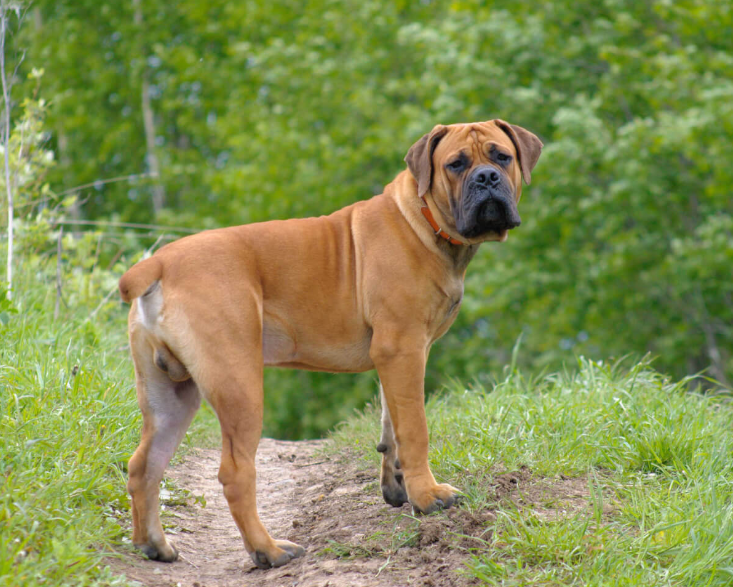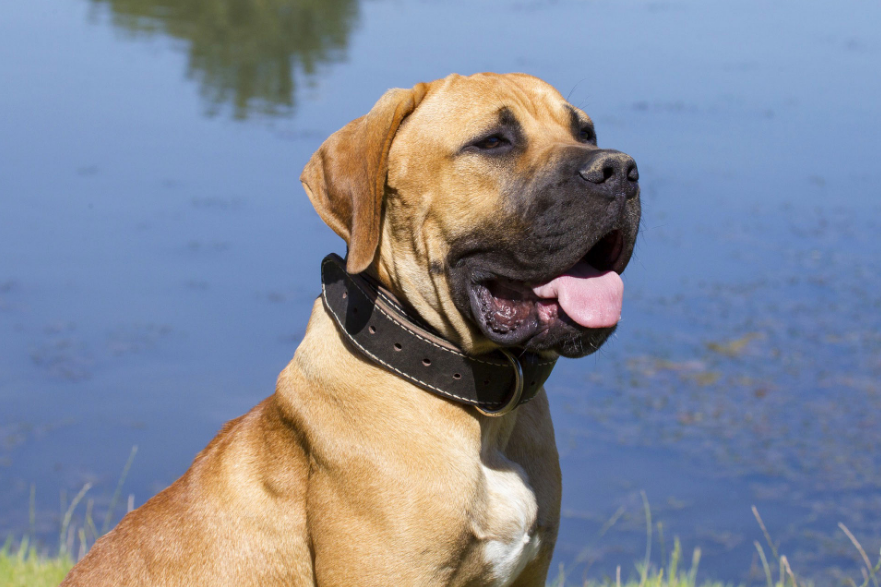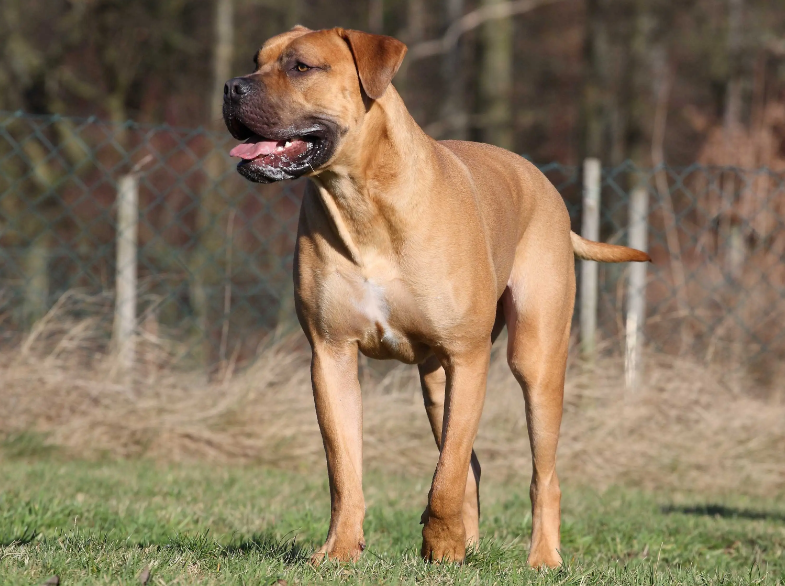Boerboel
The Boerboel can be described as a massive and strong breed of dog which originated within South Africa. “Boerboel” is an Afrikaans word meaning “farmer’s dog.” These breeds were initially bred to perform various duties on farms including protecting the homestead, herding animals, and acting as general-purpose work dogs.
The Boerboel’s most distinctive characteristics are:
Size and Build Boerboels are big and strong dogs. Males of adulthood typically measure 24 and 27 inches (61 to 69cm) at their shoulders and weigh anywhere from 150 and 200 pounds (68 to 90 kilograms).
The appearance: They have a distinct look with a wide head, strong jaws and a sleek, short coat. Their ears are typically cropped as are their tails, which are typically docked, though this method is becoming less frequent.
The Temperament Boerboels have a reputation for loyalty, protection with strong territorial tendencies. They tend to be good when it comes to their family, which includes youngsters, however, early socialization and education are crucial in order to warrant that they become healthy and well-adjusted adults.
Guardian Instincts Because of their background being farm animals, Boerboels are natural protectors. They are renowned for being active and brave, making them great guard dogs.
Exercise needs: Boerboels are a big and powerful breed, therefore they need regular physical activity in order to remain healthy and content. Regular walks, playtime along with mental stimulation is essential to their overall health.
Education: Early training and socialization are vital for Boerboels. They can be very responsive to positive reinforcement methods and are able to become more well-mannered and obeying with regular training.
Health Similar to many big breeds, boerboels are vulnerable to certain health problems, such as hip dysplasia, heart diseases and so on. Regular check-ups with a veterinarian as well as a balanced diet and a regular workout can improve general health.
Ownership considerations: Owners who are considering ownership should be ready for the responsibility of owning a huge and strong breed. Proper training, socialization along with a determination to provide adequate care are crucial.
Boerboel Health and Feeding
Health:
Regular Veterinary Check-ups:
- Regularly check-ups with your vet to assess your dog’s general health. This is crucial for large breeds that are susceptible to certain health problems.
Hip Dysplasia:
- Boerboels are susceptible to hip dysplasia. Make sure you eat a balanced diet keep an appropriate weight, and focus on providing regular moderate exercise to maintain the joint’s health.
Heart Health:
- Certain breeds with large size could be susceptible to heart problems. Regular visits to the veterinarian could benefit identify any problems early.
Parasite Control:
- Develop a program to control parasites to guard against both external and internal parasites. Regular deworming and prevention of ticks and fleas are vital.
Dietary Considerations:
- Be aware of your dog’s food requirements, particularly in the growing stages. Discuss with your vet to find the most appropriate diet program.
Exercise:
- Boerboels need regular physical activity in order to maintain a healthy weight, and mental health. However, too much exercise especially during growth periods, must be avoided in order to avoid joint problems.
Temperature Sensitivity:
- Be aware of extreme temperatures. Boerboels are susceptible to extreme heat and heat, so assure they have shade and water in hot conditions.

Feeding:
High-Quality Dog Food:
- Pick a high-quality dog food that’s appropriate for the Boerboel’s age size, and level of activity. Find a formulation that meets the nutritional requirements for large dogs.
Feeding Schedule:
- Set a regular feeding schedule to control your dog’s digestive system. Adult Boerboels can be fed twice every day, while puppies may require frequent meals.
Avoid Overfeeding:
- Check the weight of your dog and adjust the amount of food according to the weight of your pet. Overfeeding can lead to obesity and worsen certain health issues.
Protein and Nutrients:
- Check that the dog’s diet contains the proper balanced amount of fats, protein and carbohydrates, vitamins and minerals. Protein is vital to build muscle, and the balance of nutrients is important for general well-being.
Avoid Table Scraps:
- Avoid feeding your Boerboel scraps of table or food items, as this could lead to an imbalance in nutrition and weight gain.
Fresh Water:
- Make sure you have access to pure, clean water throughout the day to ensure your Boerboel healthy and hydrated.
Consult Veterinarian
- Your veterinary doctor can grant specific advice based on your Boerboel’s unique health issues and needs.
Boerboel Care and Grooming
Care:
Regular Exercise:
- Boerboels are a big and powerful breed that can benefit by regular workout. Regular walks, playtime along with mental and physical stimulation is crucial to keep them mentally and physically healthy.
Training and Socialization:
- Early socialization and training is essential for Boerboels. Regular and consistent reinforcement-based training assists them in becoming well-mannered pet companions.
Veterinary Care:
- Make sure you have regular check-ups with a vet to assess your dog’s health. Keep up-to-date with vaccinations, parasite control and dental health.
Heartworm Prevention:
- Use a heartworm prevention plan according to the advice of your doctor.
Temperature Considerations:
- Boerboels are susceptible to temperatures that are extreme. Make sure they have shade and water in hot weather and ensure you have warm and dry shelter in cooler climates.
Joint Health:
- Due their size, Boerboels could be susceptible to joint pain. Avoid vigorous exercise, particularly in their growing stages to assure their joints are protected.

Grooming:
Coat Care:
- Boerboels are sleek, short coats that need only minimal grooming. Regular brushing can benefit remove hair that is loose and keeps the coat clean.
Bathing:
- Wash your Boerboel whenever you need to, typically when they are dirty or begin to create a smell of dog. Apply a dog-friendly shampoo in order to reduce irritation on the skin.
Ears:
- Examine the ears frequently for symptoms of a bacterial infection, wax buildup or signs of bugs. If necessary, clean the ear and speak with your vet in the event that you find any problems.
Teeth:
- Make sure to brush your Boerboel’s tooth frequently to avoid dental problems. Toys and dental chews are also able to benefit in maintaining good oral hygiene.
Nails:
- Maintain their nails at an appropriate length. Nails that are too long can cause discomfort and alter their gait.
Anal Glands:
- Certain Boerboels might require periodic expression of their glands for anal. Talk to your vet to decide if this is needed.
Skin Check:
- Check your Boerboel’s skin regularly for signs that indicate irritation or lumps or bumps. If you find anything that is odd, speak to your veterinarian.
Diet:
- A healthy diet can contribute to shiny coats and overall wellbeing. Check with your veterinarian to warrant that your Boerboel is eating a nutritiously balanced diet.
FAQs
What is a Boerboel?
- A Boerboel is a massive and imposing breed of dog which originated from South Africa. They were originally bred to perform different farm jobs, such as guarding homes and herding livestock.
How big do Boerboels get?
- Boerboels are large breeds. Males of adulthood typically measure 24 and 27 inches (61 to 69 centimeters) at their shoulders and weigh 150 to 200 pounds (68 to 90 kilograms).
How do you describe the personality of the Boerboel?
- Boerboels are renowned by their loyality, protectionism with strong territorial tendencies. They tend to be good with their families, but they require the early stages of socialization as well as training.
Are Boerboels great with children?
- If properly trained and socialized, Boerboels can be good when it comes to children. But, because of the size of their bodies and strong personalities caution is advised whenever they’re around young children.
Are Boerboels need many exercise?
- It is true that Boerboels require regular workouts to ensure their mental and physical health. Everyday walks, playtime along with mental and physical stimulation is essential for this breed.
What’s the expected lifespan of the Boerboel?
- In the average Boerboels are able to live a life that ranges from 10 to 12 years. Careful nutrition, proper care and regular veterinary checks can all contribute to their general well-being and longevity.
Does Boerboels shed lots of weight?
- Boerboels are sleek and short coats that are low maintenance. They shed, but frequent brushing will benefit reduce loose hair and help keep their coats healthy.
Are Boerboel’s good guard dogs?
- It’s true, Boerboels have an instinct for protecting and guarding. They are well-known for their vigilance and courage and are therefore effective guard dogs.
What is the excellent way to teach an oboel?
- Boerboels respond well to training based on positive reinforcement. The early socialization phase is vital and consistent, hard but gentle methods of training are advised.
Do Boerboels suffer from medical issues?
- Like other larger breeds, boerboels may be susceptible to certain health issues, such as hip dysplasia or heart diseases. Regular vet check-ups as well as a healthy lifestyle benefit deal with health issues that could arise.
Are Boerboels good for first-time dog owners?
- Boerboels are a strong and strong-willed breed. As such, they are not the accurate option for the first time pet owners. Professionally trained owners who favor regular training and a social program may have satisfaction with this breed.






